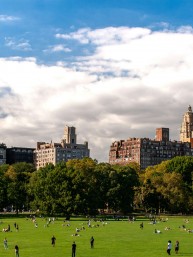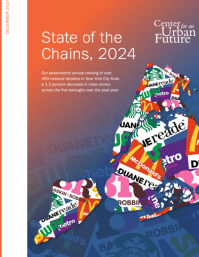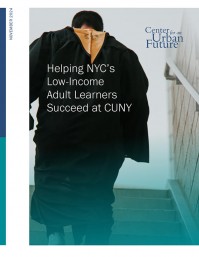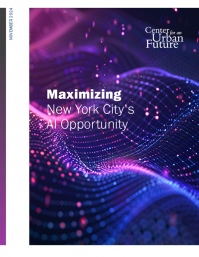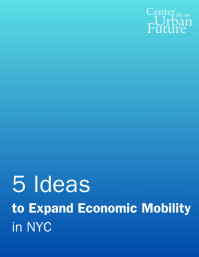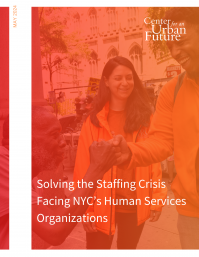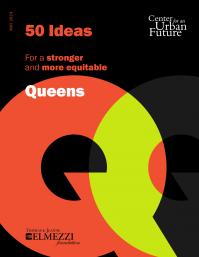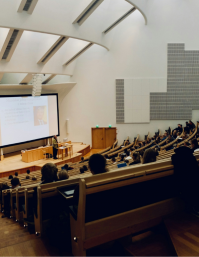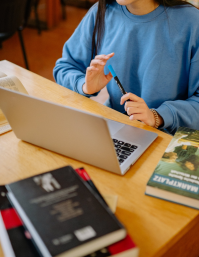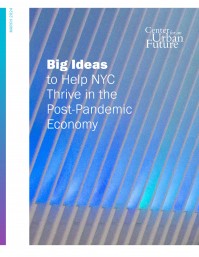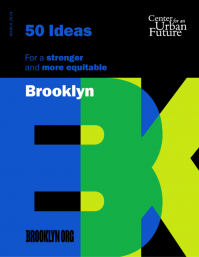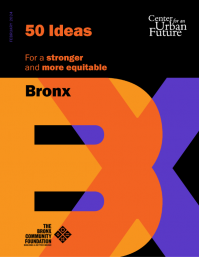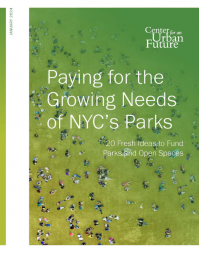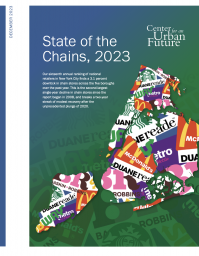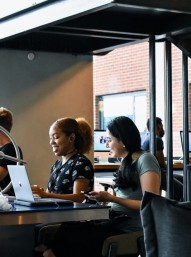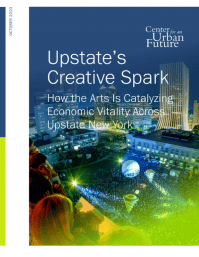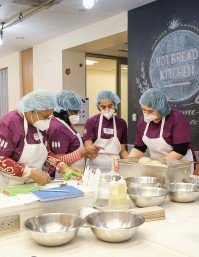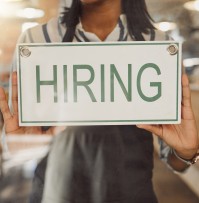Report - January 2025
Enacting a Ticket Surcharge to Strengthen New York City’s ParksNew York City’s parks badly need an infusion of funds—and a more reliable mechanism for paying for their growing maintenance needs. One option worth considering is implementing a modest surcharge on tickets sold at the city’s major stadiums, arenas, and concert venues, with the revenue dedicated exclusively to park maintenance. The report concludes that several actions are needed to implement this.
Report - January 2025
15 Policy Ideas for NYC to Start 2025As we start 2025, the Center for an Urban Future is offering up fifteen policy ideas that CUF wrote about in 2024 that we think are worth considering at a time when New York needs good local ideas more than ever, from closing educational and workforce disparities to tackling the affordable housing crisis and bolstering small businesses.
Report - December 2024
State of the Chains, 2024Our seventeenth annual ranking of over 450 national retailers in New York City finds a 1.3 percent decrease in chain stores across the five boroughs over the past year. While a wide range of retailers have been closing stores, the nation’s largest retailers are struggling the most.
Report - November 2024
Helping NYC’s Low-Income Adult Learners Succeed at CUNYNearly one-quarter of all degree-seeking undergraduate students at CUNY are over age 25, but too many of these adult learners never get to the college finish line. This report makes the case for new city and state supports that are specifically tailored to the needs of adult learners, ensuring that far more of these students succeed in earning a credential.
Report - November 2024
Maximizing NYC’s AI OpportunityTo build a stronger economy for the long term, New York will need to capture a significant share of the growth expected in a range of emerging tech fields—with none more important than artificial intelligence. The Center for an Urban Future (CUF) proposes five policy ideas for how New York City can seize this once-in-a-generation opportunity to grow NYC's AI economy and help tackle some of New York’s biggest challenges.
Report - July 2024
5 Ideas to Expand Economic Mobility in New York CityThe path out of poverty and into economic security in New York has gotten more difficult in recent decades. The Center for an Urban Future (CUF) lays out five policy ideas that city leaders can implement over the next year to expand pathways into the middle class as a part of CUF's first ever economic opportunity summit.
Report - May 2024
Solving the Staffing Crisis Facing NYC’s Human Services OrganizationsHuman services nonprofit organizations are critical to New York City’s functioning and well-being, delivering the lion’s share of safety net services to vulnerable New Yorkers. The sector also faces a staffing crisis that directly threatens its ability to deliver these much-needed services. The average human services nonprofit has more than 15 percent of its positions vacant, as well as unsustainably high levels of staff turnover.
Report - May 2024
50 Ideas for a Stronger and More Equitable QueensQueens is the city’s largest gateway for immigrants, and is also arguably New York’s most important launchpad to the middle class. Yet, given rising rents, climate change, an aging population and other challenges, Queens has significant work to do to ensure all of its residents can fully participate in the borough’s prosperity. This report presents bold policy ideas from 50 Queens leaders for what city leaders can do to create a stronger, more equitable Queens.
Report - May 2024
Closing NYC’s College Attainment GapMost well-paying jobs in New York City today go to individuals with a postsecondary degree, and studies suggest that this will only accelerate in the decade ahead. But there are still glaring racial, ethnic, and geographic gaps in college attainment rates across New York City.
Report - March 2024
Boosting Transfer Student Success at CUNYThousands of New York City public high school graduates every year start at a City University of New York community college and then transfer to a four-year institution to obtain a bachelor's degree. But the large majority of CUNY students who intend to transfer and complete a credential fall short of doing so. Improvement is possible with a few strategic steps from CUNY and modest investments from city and state leaders.
Report - March 2024
Big Ideas to Help NYC Thrive in the Post-Pandemic EconomyNew York has overcome the immediate economic tests of the pandemic, but the city still has to keep pace with a vastly changed landscape. Meeting this moment will require a seismic shift in how city officials approach economic development. This report offers five big, immediately actionable ideas that city policymakers can implement to make New York even stronger.
Report - March 2024
50 Ideas for a Stronger and More Equitable BrooklynIn many ways, Brooklyn is a shining star of the city's post-pandemic recovery. Despite all its progress, Brooklyn has significant work to do to ensure all of its residents can fully participate in the borough’s growing prosperity. This report presents bold policy ideas from 50 exceptional Brooklynites for what city leaders can do to create a stronger, more equitable Brooklyn.
Report - February 2024
50 Ideas for a Stronger and More Equitable BronxIt will be nearly impossible to create a more equitable economy in New York without putting the Bronx at the forefront. This report presents bold policy ideas from 50 exceptional Bronxites for what city leaders can do to create a stronger, more equitable Bronx.
Report - January 2024
Paying for the Growing Needs of NYC’s Parks: 20 Fresh Ideas to Fund Parks and Open SpacesThe cities that will prosper in the years ahead are those that boast an exceptional quality of life, and great open spaces are essential to that goal. Yet there is virtually no agreement on how to pay for parks' growing maintenance and infrastructure needs, while investing in new parks and open spaces in the places they’re needed the most. This report puts forth 20 concrete and achievable ideas to do just that.
Report - December 2023
State of the Chains, 2023Our sixteenth annual ranking of national retailers in New York City finds a 3.1 percent downtick in chain stores across the five boroughs over the past year. This is the second-largest single-year decline in chain stores since the report began in 2008, and breaks a two-year streak of modest recovery after the unprecedented plunge of 2020.
Report - October 2023
Boosting Tech Career Success for CUNY Students: Doubling Down on CUNY 2X TechThe CUNY 2X Tech initiative is expanding access to internships in tech firms, boosting employment outcomes for graduates, bringing industry expertise into classrooms, and helping to hire the faculty and advisors needed to support booming enrollment in tech degree programs. To make further progress toward a more equitable economy, city leaders should expand this initiative and maintain its momentum.
Report - October 2023
Upstate’s Creative Spark: How the Arts Is Catalyzing Economic Vitality Across Upstate New YorkTo reverse decades of economic stagnation and population declines in upstate New York, policymakers should look to one powerful but often overlooked catalyst: the arts. By better integrating the arts into New York State economic development planning, policymakers have an opportunity to build on recent momentum and lay the groundwork for a more vibrant, sustainable, and equitable economy.
Report - September 2023
Preparing Today’s Asylum Seekers to Be Tomorrow’s WorkforceNew York City has long struggled to help many of the city’s 2.79 million working age foreign-born residents—including over 1.4 million who have limited English proficiency—get on the path to employment. Now, tens of thousands of new asylum seekers are settling here, and the city is further behind. These newest New Yorkers can be a major boon for the city's economy, but workforce development providers need new investment to support them.
Report - September 2023
Expanding on CS4All: Training NYC’s Future Teachers to Integrate Computing EducationBy training thousands more future teachers to integrate computing education in the classroom, New York City can help far more New Yorkers access technology-powered careers. Fewer than 5 percent of CUNY teacher education graduates are equipped to teach computational thinking, preventing many of the most disadvantaged students from receiving the full benefits of the Computer Science for All (CS4All) initiative.
Report - August 2023
5 Steps for Expanding Skills-Based Hiring in New York CityThis new report finds that expanding skills-based hiring may be the greatest untapped opportunity to build a more equitable economy in New York City. It urges private sector companies and the City of New York to eliminate degree requirements for some jobs and instead hire based on an assessment of demonstrated skills, laying out five steps to get there.

